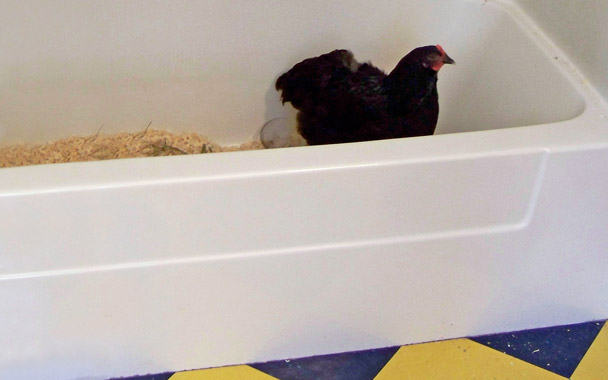When our one-day-old chicks arrived back in October from Murray McMurray Hatchery, a trusted livestock and feed company that shipped them to us overnight, they were all in fine condition except for one unfortunate, whose far right toe was injured. The other chicks were pecking her all over, and she looked like she was going down any minute. What should we do?
Lisa did some quick research. Turns out that chickens are genetically hardwired to kill a misfit rather than to waste food on something that’s likely going to die, anyway, and our other chicks probably wouldn’t stop until this little thing was a pile of bones and fluff. So we separated her from the rest by putting her on the other side of the seat/thwart (we kept our hens in a rowboat in the living room for the first six weeks), cared for the injury, and finally, in the most important step, we named her. Helen decided she looked like a “Stella.”
Jump ahead to two days ago.
It’s dusk. Lisa has heard a desperate scream from outside and yells through the house. “Hodding, something’s wrong with the chickens!” she calls out.
I had put them in for the night about 20 minutes earlier, so I was sure she was wrong. Even though I didn’t actually count how many had returned to the hen house, they always come in together on their own. “That’s Helen practicing the clarinet,” I respond.
“Hurry, Hodding. It sounds like it’s dying!”
I grab a flashlight, and seconds later I’m outside, whirling Angus’s toy sword in front of me. I’m expecting I’ll have to chase away the neighbor’s pugs, who like harassing the hens, or maybe a fox. There’s a sly one who makes his rounds every morning at four. He once stole all our Easter eggs.
“She’s right here,” Lisa says, standing by the side door. “At the bottom of the stairs.”
I scoop up the hen and instinctively look at the right foot.
“STELLLLAAAAAAAA!” I scream, my t-shirt clinging to my heaving chest. We huddle over her, petting her gently as we search for the damage. Part of her left wing is gone. There’s also a small gash on her back, and feathers are falling off as if it’s molting season.
Again, Lisa studied what we’re supposed to do, which is why Stella is currently living in our bathtub, on a bed of wood chips. She hasn’t been eating her feed, so we’ve been supplementing with whatever we can dig up out of our third garden—Lisa’s garden, in fact, which we planted on Mother’s Day. Sunday night Stella had 12 worms, 7 grubs, and 6 beetles, about half a cup of bugs. The more she eats, the better she seems to get, so all day yesterday, the kids and I were bringing in a worm or two at a time. And it appears to be working. While she didn’t move for the first 36 hours, she’s now walking around, peering over the edge of the tub and knocking over the food and water bowls.
The big problem is that she hasn’t laid an egg. This means that everything will get backed up and she’ll essentially go into toxic shock. Judging by the tears I had in my eyes the other night, her death won’t be a good thing.
So, according to Lisa, later today we have to hold her over a pot of boiling water so the steam will loosen things up. Sounds like fun, right? Wish us luck.*
Of course, it may be that Stella has never laid an egg, and the reason we’ve always had as many eggs as hens is because one hen is laying two a day. That’s my theory, but then again, that may be simply because I’m not really looking forward to steaming Stella’s rear end.
And for those of you who have been following along, we’re down to 19 chickens: 18 hens and 1 rooster. Some birds have died, and we sold four to friends. We usually get 18 eggs a day, and as of this past weekend, the kids have found almost enough clients to buy them. We’re eating and using about six eggs a day, so I hope the new conventional wisdom—that eggs are good for you and we don’t really need to worry about what they do to cholesterol—is correct. Also, a couple of those egg buyers sampled our homemade bread and so we’re selling a couple of loaves each week, too. Not bad for a family of former spendthrifts, huh?
*I’ll provide an update in a day or two in the “Comments” section for those of you who are anxiously awaiting the results.
Frugal Tip of the Week
Many grocery stores sell light green, transparent plastic bags invented by a woman named Debbie Meyer, who claims they will prolong your produce’s refrigerator life. Guess what? They actually work. Lisa bought a dozen in December, and we’re now in the habit of transferring every vegetable we buy into these bags. There’s a mineral in the bag that absorbs ethylene gas—a by-product of the ripening fruits and vegetables. I was, of course, originally a skeptic, but am now an avid promoter. Just be sure to remove any moisture build-up, and you’ll find that most things will last at least as twice as long as usual.


